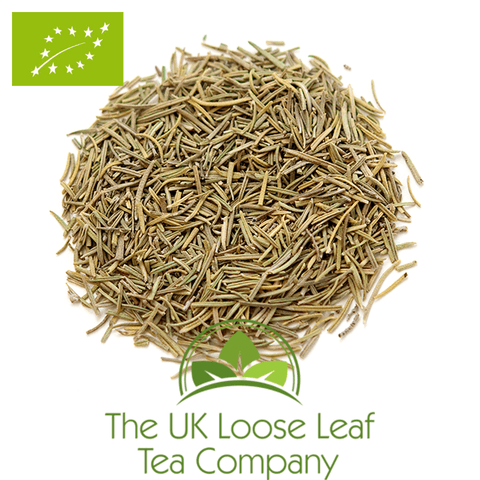
Rosemary Leaf Organic



Rosemary Leaf Organic ~ Salvia rosmarinus
Rosemary has a long history of culinary and aromatic uses, in addition to applications in traditional herbal and Ayurvedic medicine.
The rosemary bush (Rosmarinus officinalis) is native to South America and the Mediterranean region. It’s part of the Lamiaceae family of plants, along with mint, oregano, lemon balm, and basil.
Here are 6 potential health benefits and uses of rosemary tea, as well as possible drug interactions and a recipe to make it.
Antioxidants are compounds that help protect your body from oxidative damage and inflammation, which can lead to chronic diseases like cancer, heart disease, and type 2 diabetes.
They can be found in a variety of plant foods, such as fruits, vegetables, and herbs like rosemary. Rosemary tea also contains compounds that may have anti-inflammatory and antimicrobial properties.
The antioxidant and anti-inflammatory activity of rosemary is largely attributed to its polyphenolic compounds like rosmarinic acid and carnosic acid.
The compounds in rosemary tea may also have antimicrobial properties, which may help fight infections. Rosemary leaves are employed in traditional medicine for their antibacterial and wound healing effects.
Studies have also investigated the effects of rosmarinic and carnosic acid on cancer. They have found that the two acids may have antitumor properties and even slow the growth of leukemia, breast, and prostate cancer cells.
When left untreated, high blood sugar can damage your eyes, heart, kidneys, and nervous system. Therefore, it’s critical that people who have diabetes properly manage their symptoms.
Studies have shown that compounds in rosemary tea may lower blood sugar, suggesting that rosemary could have potential applications for managing high blood sugar among people with diabetes.
3. May improve your mood and memory.
Experiencing stress and anxiety from time to time is common.
Though studies on rosemary tea specifically are lacking, evidence shows that drinking and inhaling compounds in rosemary tea may help boost your mood and improve your memory.
One study found that taking 500 mg of oral rosemary twice daily for 1 month significantly lowered anxiety levels and improved memory and sleep quality among college students, compared with a placebo.
Another 2-month study in 66 industrial employees noted that those who drank 2 teaspoons (4 grams) of rosemary in 2/3 cup (150 ml) of water daily reported feeling significantly less burnt out at their jobs, compared with those who drank nothing.
Consuming and inhaling compounds in rosemary have been shown to reduce anxiety, boost mood, and improve concentration and memory. Both smelling and drinking rosemary tea may offer these benefits, but more research is needed.
Some test-tube and animal studies have found that compounds in rosemary tea may protect the health of your brain by preventing the death of brain cells.
Other studies suggest that rosemary may prevent the negative effects of brain aging, even suggesting a protective effect against neurodegenerative diseases like Alzheimer’s.
While studies on rosemary tea and eye health are lacking, evidence suggests that certain compounds in the tea may benefit your eyes.
One study examined the addition of rosemary extract to common treatments like zinc oxide and other AREDs antioxidant combinations, finding that it helped slow age-related macular degeneration (AMD), a common condition that affects vision.
Rosemary has been studied for many other uses.
Other potential benefits of the compounds in rosemary tea include:
- May benefit heart health.
- May promote digestion.
- One animal study found that rosemary extract reduced the risk of heart failure following a heart attack.
- Rosemary extract is sometimes used to treat indigestion, but research on this use is lacking. Still, rosemary is thought to support digestion by promoting a healthy balance of gut bacteria and reducing inflammation.
- May promote hair growth. Some people claim that using homemade rosemary tea as a hair rinse promotes hair growth, but research is lacking. Some studies suggest that rosemary oil or extract can reduce hair loss but has to be applied to the scalp.
While these benefits seem promising, more research is needed, particularly to determine what benefits drinking rosemary tea may offer.
Potential drug interactionsAs with many other herbs, some people may need to exercise caution when consuming rosemary tea due to its potential drug interactions.
Some of the medications with the highest risk of interacting negatively with rosemary tea include:
- anticoagulants, which are used to prevent blood clots by thinning your blood
- ACE inhibitors, which are used to treat high blood pressure
- diuretics, which help your body get rid of extra fluid by increasing urination
- lithium, which is used to treat manic depression and other mental health disorders
Rosemary can have effects similar to those of these medications, such as increasing urination, impairing blood clotting ability, and lowering blood pressure. If you take lithium, the diuretic effects of rosemary can lead to toxic levels of lithium accumulating in your body.
If you’re taking any of these drugs — or other medications for similar purposes — it’s best to speak with your healthcare provider before adding rosemary tea to your diet.
Rosemary tea is very easy to make at home and only requires two ingredients — water and rosemary.
To make rosemary tea:
- Bring 10 ounces (295 ml) of water to a boil.
- Add 1 teaspoon of loose rosemary leaves to the hot water. Alternatively, place the leaves in a tea infuser and steep them for 5–10 minutes, depending on how flavourful you like your tea.
- Strain the rosemary leaves from the hot water using a mesh strainer with small holes, or remove them from the tea infuser. You can discard the used rosemary leaves.
- Pour your rosemary tea into a mug and enjoy. You can add a sweetener, such as sugar, honey, or agave syrup if you like.
